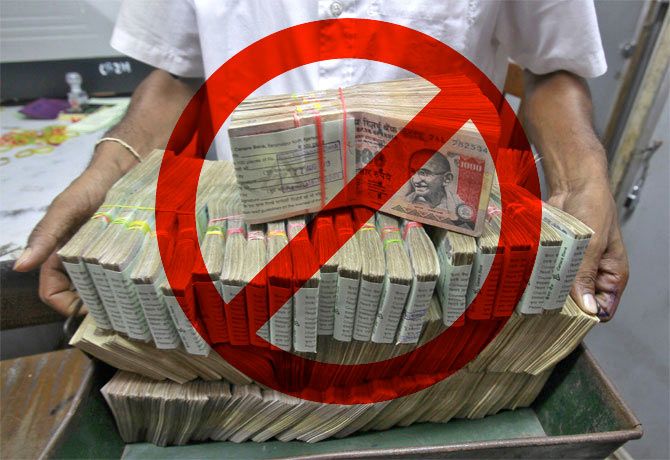'You are unable to attack creation of black money.'
'You have not stopped that, but are now coming up with such rules.'
'It is so stupid and unbelievable.'
'This ordinance is a very scary way of going about it.'
The Centre's December 28 ordinance to penalise those found having more than 10 demonetised notes of Rs 500 or 1,000 after March 31, 2017 with a four-year jail term or a penalty five times the value of notes found, has drawn sharp criticism.
Two well known financial planning experts spoke to Rediff.com's Prasanna D Zore and termed the decision "ridiculous" and "unbelievable."
They also said it is like a decision taken in "Tughlaq raj," a reference to Mohammad bin Thuglak, the capricious ruler in 14th century India.

P V Subramanyam, a Mumbai financial planning expert and a former banker, was taken aback when he heard that such an ordinance has actually been approved by the Union Cabinet.
"How will they know (about the existence of such notes in excess of 10)? Will they go to every house?" Subramanyam asked.
"Amazing! This is Tughlaq raj," he said about the ordinance.
When told that a municipal magistrate, according to this law, will decide upon the criminality of such notes and impose a penalty, Subramanyam said, "I run a risk that my mother has some old notes in her purse in our old house and we need to go and check. I am sure there will be two, three notes of Rs 500 or Rs 1,000 because she does not like to keep any of her purses empty. We have not bothered to check these. How are they (the authorities) going to check it?"
"And how will one pay the fine? Suppose you come to my house and find more than 10 notes and fine me five times the amount which I will have to pay in new notes. Will I let them take those perfectly legal notes with them for the ones which have no value now?" he said.
When asked if this is a kind of war on black money, he said, "You are unable to attack the creation of black money. Even after this demonetisation, while I was travelling by train, I saw a person giving a bribe (in cash) and getting a seat for himself. Are you saying that you stopped corruption? What is the cause of black money? You have not stopped that, but are now coming up with such rules. It is so stupid and unbelievable."
Subramanyam wondered how will the investigating authority "ever, ever, ever, be able to levy any penalty?
"For finding such notes you will have to raid every house and what will be the cost of these raids?" he asked.
"You come to my house and find only five notes and then you have to bid me goodbye because this ordinance kicks in only if I have 10 notes," he said.
"Ridiculous!'" is what Bengaluru financial planning expert Anil Rego said about the ordinance.
Laughing at the new rule, Rego said, "I am not sure what they are trying to achieve with this (ordinance). The only purpose it could have is to create fear in the minds of the people so that whatever is still out of the system comes back quickly by December 30 or March 31, by which time you can still deposit your old notes with the RBI (Reserve Bank of India)."
Rs 500 and Rs 1,000 notes are still legal currency and those who are abroad, who have still not deposited it in any banks in India, will continue to hold them till they come back and deposit these old notes, Rego said.
"This (ordinance) is a very scary way of going about it," Rego said.
"It's an odd one and that's why I laughed at it; to me these are badly thought of," he said.
Rego suggests that the government's good intentions would have definitely borne fruit if the process of depositing or returning the old notes was done in a streamlined fashion.
"Why set a deadline to deposit these notes? It could have been done in a very matter of fact way too. A foolproof process should have been thought of for not allowing people to be able to cheat the system and get their money deposited in banks," he suggests.
According to Rego, out of Rs 15.4 lakh crore in Rs 500 and Rs 1,000 denomination prior to demonetisation, Rs 15 lakh crore is likely to come back to the banks.
"There could be a huge surge (in deposit of old notes) in the last two days (December 29 and 30)," he said.
According to reports by December 27 almost Rs 14 lakh crore had made its way into the banking system.
"The figures clearly prove that those who had hoards have managed to convert a significant part of it into accounted money now," he said.
Rego reckoned that at the most, the RBI will be able to cancel only Rs 50,000 crore of its liability and wondered if this is what the government's aim was when demonetisation was set in motion.
According to Rego, the government should have taxed the black money at a reasonable rate so that more money could have been taxed and made official instead of allowing the unaccounted money in circulation to leave the system.










